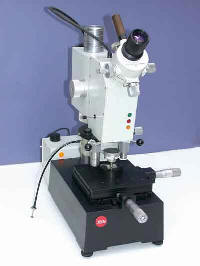|
MICROHARDNESS TESTING
* Micro hardness Testing (Knoop and
Vickers): Hardness testing in general is performed to assess the strength of the
material. With micro hardness testing the strength is examined on a micro scale
by determining the strength of a carburized case for example or by determining
the strength of a certain micro constituent in the microstructure. Usually micro
hardness is specified with relatively smaller loads 500 grams or lower to
measure an effective case depth or effective decarburization, etc.
* Effective/Total Case Depth Measurement: Case depth or case hardening is
specified on many types of parts and components that require surface
fatigue strength and wear resistance. When specified by the engineering print it
is typically specified with a required case depth. This case depth is specified
as either effective or total case depth. We can measure both per standard ASTM
or SAE test methods. The effective case depth is measured with micro hardness to
determine the depth of the hardening layer at which the micro hardness of the
material drops to 50 Rc or specific hardness number that is typically 5 Rc
points or more above the core hardness or 5 Rc points or more below the surface
hardness. The standard effective case depth measurement is to measure the
distance from the surface to a location below the surface at which the hardness
is 50 Rc. The total case depth measures the visual / chemical change in the
material from the surface after a polish and etch process effected by the
additions of carbon to the surface of the component and does not typically
involve hardness measurements. Let us know your requirement and we can provide
you with accurate results.
* Hardness Measurements
(Rockwell, Superficial, Brinell, Portable): Full range of direct hardness
testing capabilities of all scales and methods. We understand ASTM E10 and E18
and we perform our hardness testing per required specifications . We also have
digital portable hardness testers.
|



